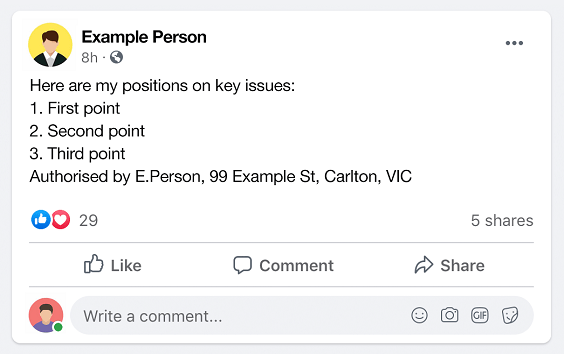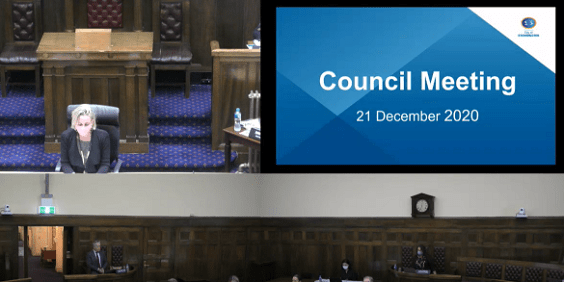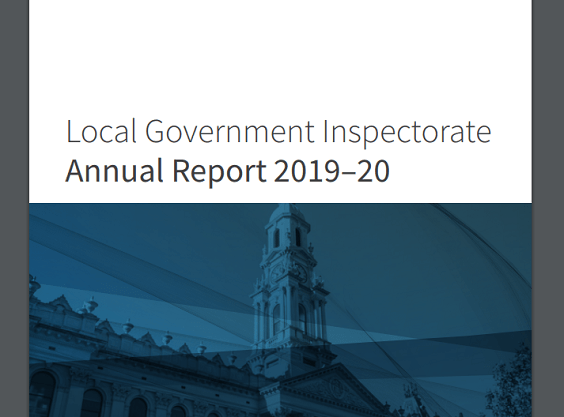- Date:
- 19 Oct 2020
Welcome to the first edition of integrity matters for 2021 in what we hope will be an easier year for the Victorian community – and the local government sector.
The past 9 months was an extremely challenging time for the sector and my team again wishes to extend our thanks for your patience and understanding.
We have been through the 2020 council elections with 76 elections being conducted by postal vote and the majority of campaigning being conducted online for the first time. Social media continues to play an increasing role in election campaigning and activism over local issues and we will discuss some of the issues and challenges this created in our upcoming election report. I wish to acknowledge the hard work of councils and the Victorian Electoral Commission in preparing for and handling a very different election period.
The next stage of Local Government Act 2020 reforms, including new governance rules, expenses policy and committee rules, were implemented by 1 September 2020 and electoral rules came into force on 26 October.
On to current events and the Victorian Government commenced the phased return of Victorian Public Service (VPS) staff to workplaces from Monday 18 January 2021.
Along with many other non-frontline government departments and agencies, the Inspectorate has begun a gradual return to the office with up to 25 per cent of staff. Working from home arrangements will continue in line with government restrictions and advice.
In this edition, we:
- look at interest returns summaries
- preview our election reporting
- look at our annual report highlights
- welcome a new team member with significant local government experience
We look forward to engaging with you throughout the year and providing support and advice where possible.
Dr John Lynch PSM
Acting Chief Municipal Inspector
Councils must publish summary of interests
All councils must publish a personal interest information summary on their website. This is a new requirement under the Local Government Act 2020.
Read the Local Government Act 2020(opens in a new window).
- councillors
- CEOs
- nominated officers
- delegated committee members
You must publish your personal interest information on your website within 30 days:
- of taking the oath of office (for councillors) or within 30 days
- after 24 October 2020 when the legislation commenced (for all others)
The Act requires declaring all private interests, including:
- property ownership
- company directorships
- major shareholdings
Personal interest summaries
Summaries must:
- contain ‘sufficient information to identify the type and nature of the interests disclosed’
- be published on the council’s website
- be available for public inspection
The legislation does not set a specific date for publishing a summary. But we encourage councils to prepare and publish their summaries as a priority. This promotes and enhances transparency in local government. It also reduces the risk or likelihood of bias in decision-making or undisclosed conflicts of interest.
New required disclosures
The new legislation also introduced strict additional disclosures. As of 24 October 2020, you must also disclose:
- employment details
- business relationships
- debt
You can read more about the new requirements in the Local Government (Governance and Integrity) Regulations 2020(opens in a new window).
Audit found councils lacking
We recently conducted a sample audit of 10 council websites in January 2021.
We found that:
- just one council had published a summary which complied with the Act
- five councils had not published summaries
- one council had published a summary for councillors and the CEO - but not nominated officers
- three councils did not include ‘sufficient information’ that would allow a member of the public to understand the nature of the interest
We identified some deficiencies during our review of the personal interest summaries.
Place of residence
We saw disclosures of ‘home’, ‘residence’ or similar title only. Under the Act, you must disclose more information:
- including the town or suburb the residence is located
- not including the street address or number
Paid employment
We observed some disclosures of a person’s employer’s name only. Sufficient disclosure requires also listing the person’s position with that employer.
Working with local government
Local Government Victoria (LGV) conducted an online feedback project(opens in a new window) on personal interest returns in 2020. The project provides useful resources and explanations of the new rules and regulations. We will continue to work with LGV to ensure councils have more guidance about what should be in a summary.
We are also finalising a compliance project on councillor interest returns. We will release a public report with the findings and recommendations.
Read more about putting the right details into interest returns(opens in a new window).
New face joins Inspectorate
Tony De Fazio has joined the Local Government Inspectorate, bringing decades of local government experience and knowledge to our team.
Mr De Fazio has worked in local government for 44 years across five different councils: Essendon, Preston, Port Melbourne, Hobsons Bay and Whitehorse.
He finished his local government career as the Executive Manager of Governance and Customer Service at Whitehorse City Council before joining the Inspectorate.
“After I retired, I realised that I still had something to give. I am passionate about local government and wanted to make an ongoing contribution to the sector,” Mr De Fazio said.
“The opportunity came up to join the Inspectorate and it was a perfect match for my skills and experience.”
He brings a deep understanding of local government policies, processes and systems.
Since starting at the Inspectorate in December 2020, Mr De Fazio is getting a broader perspective of state-wide issues.
“There is an ongoing need for continuous improvement, training and awareness in local government,” Mr De Fazio said.
Better communication can help resolve complaints - a brief explainer by Tony De Fazio
The local government sector, with the Inspectorate’s support, has some work to do to improve community understanding and transparency of its decision making.
Many of the complaints the Inspectorate receives are from people who are aggrieved by a council decision or process and request an investigation alleging fraud, corruption, bias and or gross misconduct.
While the Inspectorate is responsible for receiving, assessing and investigating breaches of the Local Government Act 2020, the Inspectorate cannot substantiate or proceed further with any investigation or action without any clear evidence.
There are also many cases where complaints are backed by solid evidence that exposes poor or deficient processes, policies, procedures, delegations and accountability at councils.
For example, we received a substantiated complaint that a general manager signed off the extension of a multi-million-dollar service contract when only the CEO or Acting CEO had the council delegated authority to do so. This was in breach of section 186 (Procurement Policy) of the Local Government Act 1989 where the policy, delegation limits, authority and a council resolution were clearly not followed nor complied with.
It is also important for councils to effectively consult with individuals and community and to explain and raise awareness of the decision-making processes and the rationale involved.
Council websites should be improved to allow the community to understand council processes and decision making. The explanations need to be clearly communicated without using local government jargon.
For example, we received an enquiry from a complainant who had questions on a specific council’s governance rules and how Question Time worked.
The rules listed on the council website stated that the mayor or chair could reject any public questions regarding proposed developments. The complainant interpreted this to mean that the mayor and council were ‘gagging’ the community and not being transparent or consultative. This issue may have been avoided if the council included an explanation on its website detailing Question Time rules and council’s obligations and liability regarding confidential information.
A better understanding of council processes would help reduce the number of complaints the Inspectorate receives and reduce frustration when complainants discover we cannot investigate a complaint.
Social media influences rise in election complaints
We anticipated the pandemic would reduce the number of council election complaints in 2020 - instead there was a significant rise in complaints related to online material.
During the election period, we received more than 220 complaints related to online or electronic material (such as social media, website or email).
Although the official election period ended on 25 October, we continue to receive and accept election-related complaints. However, we can no longer accept complaints related to pre-election matters such as incorrect social media authorisations or campaign signage.
Many recent enquiries have involved campaign donation returns. All councils (except those who did not hold elections) were due to publish a summary of campaign donations on their website by 17 December 2020.
We are compiling a full elections report which will be presented to the Attorney-General and Minister for Local Government before being made public.
Continued changes to council processes due to COVID-19
Council meetings are set to resume in February but many will continue online to comply with COVID-19 restrictions on public gatherings.
The COVID-19 Omnibus (Emergency Measures) and Other Acts Amendment Bill 2020 was extended in October 2020 to ensure virtual council meeting provisions remain in place until 26 April 2021.
Local Government Victoria (LGV) has published a Ministerial Good Practice Guideline to help councils use these mechanisms. The roadmaps for metropolitan Melbourne and regional Victoria, as well as industry restrictions by region, are available on the Coronavirus (COVID-19) roadmap for reopening website.
LGV has informed councils - based on interpretations of the Act - on aspects such as public attendance at meetings, options for online rather than in-person meetings and delegation of authority.
More details from LGV bulletins are available on the LGV website.
Annual report published
The Local Government Inspectorate’s Annual Report 2019–20 was published in December. It outlines work to strengthen the integrity, accountability and transparency of local government in Victoria.
During 2019-20, we assessed 272 complaints and completed 56 investigations. As with many public and private sector organisations, COVID-19 provided additional challenges to our work and our staff had to transition to work remotely while continuing ongoing investigations and preparing for the 2020 local council elections.
Acting Chief Municipal Inspector Dr John Lynch said: "In these unprecedented times, coronavirus has shown us that transparency in local government is vital."
“It has also shown us the value in having a robust integrity system which can oversee the decisions made on our behalf - even if they are taking place behind closed doors."






